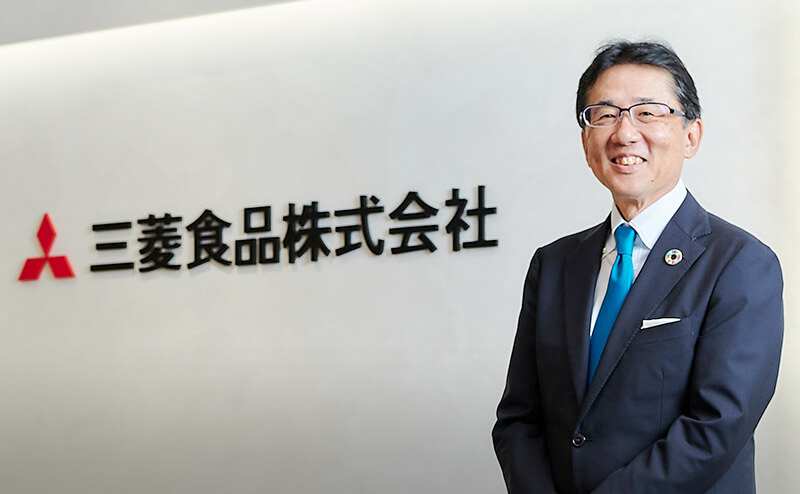Policy and Structure
Sustainability Policy
The Mitsubishi Shokuhin Group seeks to achieve the realization of a sustainable society through the food business as follows:
- By resolving social issues, including the conservation of the global environment, and contributing to the realization of a sustainable society, the Mitsubishi Shokuhin Group will enrich the lives of all its stakeholders.
- We respect human rights, diverse values, and individuality.
- We consider our employees to be our greatest asset, and by establishing a healthy, safe, and comfortable working environment for them and respecting different working styles, we encourage skills development for each individual and enhance both professional and private lives.
- As well as complying with international rules and respecting related laws and regulations, we practice fair and transparent corporate governance.
- We engage in active dialogue with stakeholders, and disclose corporate information in a timely and appropriate manner.
- As a company that shares responsibility for the food lifeline that is the foundation of everyday life, we build socially and environmentally aware supply chains to enable us to maintain safe, secure, and stable supply of food at all times.
- By nurturing rich food cultures both in Japan and around the world, we help create environments in which people everywhere can live healthily.
- We will continue to perform social contribution activities that address changes in the needs of society and in the issues that it faces.
Supply Chain Management Guidelines
In addition to the Three Corporate Principles (Corporate Responsibility to Society, Integrity and Fairness, Global Understanding Through Business), which have guided its corporate philosophy, Mitsubishi Shokuhin has defined our “purpose” as “contributing to the realization of a sustainable society through the food business”.
Moreover, in Sustainability Policy, Mitsubishi Shokuhin declares our commitment to respect human rights, to comply with all relevant laws and international regulations and to resolve challenges in our society including preservation of the global environment. Mitsubishi Shokuhin will make every effort to realize a sustainable society.
1. Basic Policy
For Mitsubishi Shokuhin, which aims to evolve into a next-generation food distributor in order to contribute to the realization of a sustainable society through the food business, ensuring sustainable supply chains is a key issue.
Mitsubishi Shokuhin has established the Mitsubishi Shokuhin Policy for Sustainable Supply Chain Management, which outlines its actions to address human rights, labor rights and environmental issues in the supply chain.
This policy serves to convey Mitsubishi Shokuhin’s fundamental perspective to all its suppliers. Mitsubishi Shokuhin asks them to understand and practice the items stipulated below in order to achieve sturdy and sustainable supply chains.
-
(1) Forced Labor
Suppliers shall employ all employees of their own free will with no employee being subject to forced or bonded labor.
-
(2) Child Labor
Suppliers shall not employ people under the minimum legal working age of the country in question.
-
(3) Safe and Healthy Working Environments
Suppliers shall work to provide employees with safe and healthy working environments.
-
(4) Freedom of Association and Collective Bargaining
Suppliers shall respect the right of employees to associate freely and engage in collective bargaining as methods of negotiating working environments, wages and other matters with employers.
-
(5) Discrimination
Suppliers shall strive to ensure equal opportunities in the work place and shall not engage in discrimination with regard to recruitment and employment practices.
-
(6) Abuse and Harassment
Suppliers shall respect employees’ human rights and must not tolerate abuse or any form of harassment.
-
(7) Working Hours
Suppliers shall ensure that employees’ working hours and use of leave entitlements are appropriately monitored and that excessive overtime labor is prohibited, so as not to infringe upon any statutory regulations.
-
(8) Suitable Remuneration
Suppliers shall pay employees at least the statutory minimum wage, endeavor to pay at least the living wage, and shall not unreasonably reduce wages.
-
(9) Anti-Corruption
Suppliers shall engage in fair business practices, avoid corruption including bribery and extortion, and comply with applicable laws and regulations.
-
(10) Environment
Suppliers shall endeavor to protect the environment and consider the impacts of their business activities on local communities and ecosystems, while paying special attention to energy use efficiency, climate change issues such as greenhouse gas emissions, sustainable use of resources, waste reduction, and air, soil, river and marine pollution.
-
(11) Information Disclosure
Suppliers shall disclose information with respect to the aforementioned matters in a timely and appropriate manner.
2. Monitoring
Mitsubishi Shokuhin will strive to strengthen communication with suppliers in order to monitor the status of their compliance with the Basic Policy.
3. Human rights and environmental due diligence on our supply chain
From the perspective of sustainable supply chain management, in FY2022, we appointed a consultant to conduct a survey (“Supply Chain Survey”) of its suppliers regarding their status of compliance with the Mitsubishi Shokuhin Supply Chain Management Guidelines, a policy for addressing human rights, labor issues, the global environment, and other issues.
The Supply Chain Survey targeted the top dozens suppliers with the largest transaction value (105 companies in total) out of domestic suppliers, contract manufacturers, and contract logistics service providers, taking into account their impact on the supply chain.
The Supply Chain Survey identifies issues specific to the industry to which each supplier belongs and assesses risks, focusing on the prohibition of forced labor, child labor and discrimination against employees, respect for employees' right to organize, environmental protection, and information disclosure, based on the contents of the Mitsubishi Shokuhin Supply Chain Management Guideline.
To ensure the effectiveness of human rights and environmental due diligence, we are considering the introduction of a system that will enable us to work with suppliers facing challenges to make improvements based on the results of each supplier's responses.
4. Supplier communication/engagement
For suppliers, we publish and share the Mitsubishi Shokuhin Supply Chain Management Guidelines on our website. We also ask suppliers to comply with these guidelines in our contract template*.
Furthermore, as mentioned above, we conduct the Supply Chain Suevey to check the status of suppliers' activities, including their compliance with these guidelines.
*Merchandise Sales Contract, Merchandise Manufacturing Consignment Contract, Merchandise Import Contract, Logistics Service Consignment Contract
5. Response to Compliance Violations
If an instance of violation of this guideline is identified, we will request the supplier in question to take corrective measures and, if necessary, provide guidance and support to the supplier.
Promotion framework
In order to strategically promote initiatives for sustainability throughout the company, we have established a dedicated organization under the Corporate Planning Division as of April 1, 2020. We are working to integrate it into management, strengthen stakeholder engagement, and raise internal awareness.





